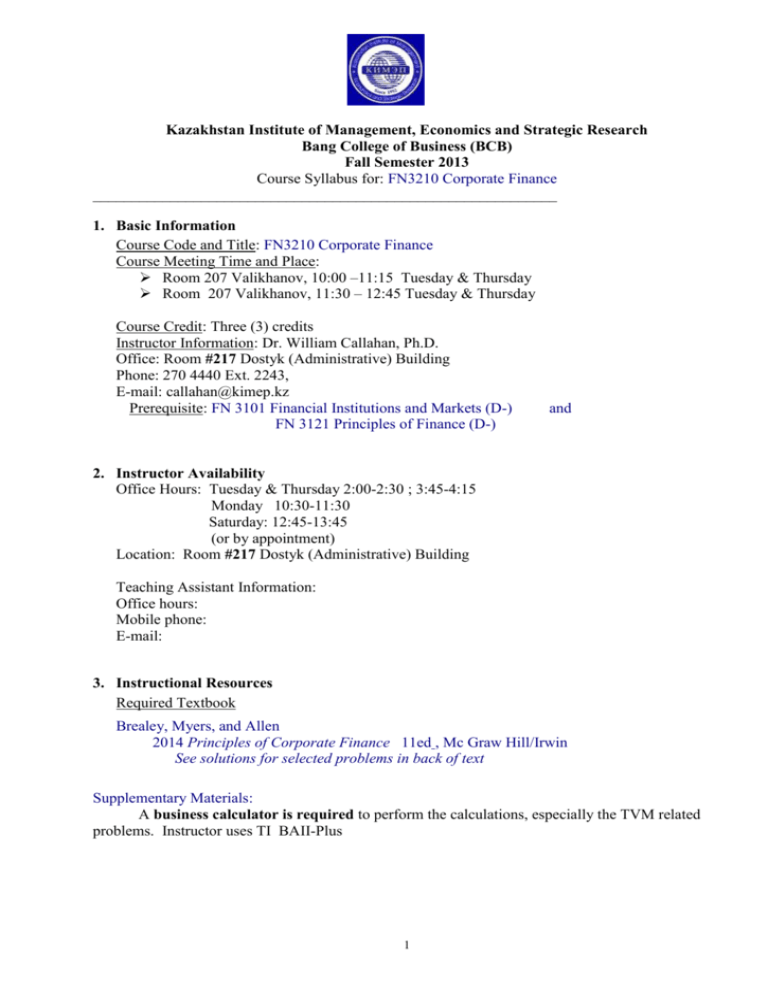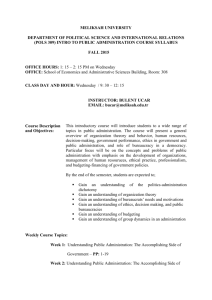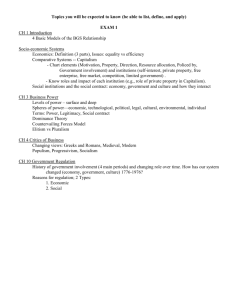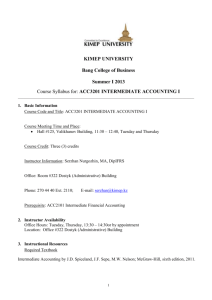Corporate Finance
advertisement

Kazakhstan Institute of Management, Economics and Strategic Research Bang College of Business (BCB) Fall Semester 2013 Course Syllabus for: FN3210 Corporate Finance ____________________________________________________________ 1. Basic Information Course Code and Title: FN3210 Corporate Finance Course Meeting Time and Place: Room 207 Valikhanov, 10:00 –11:15 Tuesday & Thursday Room 207 Valikhanov, 11:30 – 12:45 Tuesday & Thursday Course Credit: Three (3) credits Instructor Information: Dr. William Callahan, Ph.D. Office: Room #217 Dostyk (Administrative) Building Phone: 270 4440 Ext. 2243, E-mail: callahan@kimep.kz Prerequisite: FN 3101 Financial Institutions and Markets (D-) FN 3121 Principles of Finance (D-) and 2. Instructor Availability Office Hours: Tuesday & Thursday 2:00-2:30 ; 3:45-4:15 Monday 10:30-11:30 Saturday: 12:45-13:45 (or by appointment) Location: Room #217 Dostyk (Administrative) Building Teaching Assistant Information: Office hours: Mobile phone: E-mail: 3. Instructional Resources Required Textbook Brealey, Myers, and Allen 2014 Principles of Corporate Finance 11ed , Mc Graw Hill/Irwin See solutions for selected problems in back of text Supplementary Materials: A business calculator is required to perform the calculations, especially the TVM related problems. Instructor uses TI BAII-Plus 1 4. Course Description/Overview This is an intermediate business financial management course, combining theory and applications. The course focuses on detailed look at capital budgeting methods including financial planning and forecasting, Net Present Value and Internal Rate of Return, capital budgeting under uncertainty, risk and return analysis, capital structure policy, dividend policy, working capital management, corporate restructuring and Leasing. The use of a financial calculator is required for the solving of modern day financial business problems. An added topic will entail a discussion on Business Ethics as related to Corporate Finance. We will look at some of the greatest failings in Corporate Governance in the past and examine how companies are attempting to place safeguards in their governance structure which will prevent past happenings from occurring again. 5. Learning objectives At the end of the course, students should be able to do the following: KNOWLEDGE: Students will have an understanding of fundamental concepts of financing (capital structure) and investment (capital budgeting) decisions, corporate governance and Business Ethics risk and what-if analysis in capital budgeting risk & return and the methods for calculating cost of capital Corporate Governance and Ethics Efficient Markets dividend policy basics Working Capital Management Leasing, Security issuance SKILLS: Students will learnt to use the various types of capital budgeting decision rules to accept/reject a capital investment utilize the various financial formulas and understand how to interpret the results use a financial calculator APPLICATION ABILITIES: Students will be able to Develop efficient and effective procedures and policies. Implement ethical decisions and incorporate strategies to achieve goals and objectives. Link various forces acting on and challenges facing the organization. Develop effective groups to solve financial problems. VALUES AND ATTITUDES: Students practice KIMEP Core Values Academic honesty Respect for peers and instructors 6. Teaching Methodology The format of the course is basically lectures but also includes the following: Power point slides and electronic computer programs in problem solving Group presentations which discuss problem solving and decision making techniques; Special Business Ethics assignment Use of Excel in solving problems 2 7. Assessment Scheme Continuous Assessment 2 Mid Term Exams (25% each) Business Ethics assignment Group Work 60% 50% 5% 5% Final Assessment Final Exam 40% 40% TOTAL 100% ASSESSMENT IN DETAIL A student’s learning outcomes and final grades will be assessed according to his/her performance in the following areas: (1) Mid-term examinations for 40% of total points, which may include problem solving and multiple-choice questions. Students who miss an exam will receive 0 points for each missed exam. There will be NO MAKE-UP exam under any circumstances or any form of retake for the missed exam later on. Unusual emergencies will be handled on a case by case occurrence. (2) This will include special Business Ethics assignment (5%). (3) Class Work (5%) will consist of Groups presenting finance problems or other brief cases periodically throughout the semester. 3 people will be maximum number in a Group. This is your responsibility to be present when your group is called upon. You may not be given another chance as time is a limiting factor. Groups will be limited to 15 minutes and will be graded according to their knowledge and procedure for solving problem. (5) The final examination will be for 40% points: The final examination should be comprehensive but actual contents to be determined by professor later in semester and will be conducted during the final examination week. Government REQUIREMENT in the grading results – any student who has less than 50% after Assessment 2 will not be allowed to sit for the Final Exam (thus dropped from the class) 3 8. Grading Scale May be adjusted by Registrar Letter grades for the course will follow the same standards as specified in the Catalog. See the following table for grading scale: Letter grade A+ A AB+ B BC+ C CD+ D DF Numerical scale or percentile 90-100 85-89 80-84 77-79 73-76 70-72 67-69 63-66 60-62 57-59 53-56 50-52 Below 50 9. Course Policies and Instructor’s expectations of students Attendance of lectures, tutorials, and exams is up to student. There will be attendance recorded but it will not be part of the grade. However, all students are expected to attend class, and to arrive in the classroom before the class begins. Students who show up late for lectures, tutorials, or exams may not be allowed to enter the classroom. There will be no Incompletes unless extreme circumstances (approved by Professor) Discipline Students who disturb the teaching process (by talking etc.) will be asked to leave the classroom. In case of cheating instructor has the right to cancel the assignment (exam) and report the case to the Academic Disciplinary Committee. Indeed the policies listed (e.g., Code of Classroom Conduct, Plagiarism, Examination Rules, Breaches Reporting, etc) in Academic Discipline section of KIMEP Catalog 2009-2010 will be strictly enforced . Academic honesty: We have a zero tolerance policy for academic dishonesty. Check the catalog for details. Cell phones: should be turned off at the beginning of the class, or put it on vibrate or silent mode (in case of emergency). Information dissemination: Information regarding this course and assignments will be given by the instructor during the class or can be found on the L-drive. No checking E-mails or surfing the Internet during the class. Students are also expected to check their Umails. Enrollment in the course constitutes an agreement with the terms and requirements in this syllabus. 4 10. Period-by-period Schedule (Tentative) Week 1 / Sept 3&5 2 / Sept 10&12 3 / Sept 17&19 4 / Sept 24&26 5 / Oct 1&3 6 / Oct 8&110 7 / Oct 15&17 8 / Oct 22&24 9 / Oct 29&31 10 / Nov 5&7 11 / Nov 12&14 12 / Nov 19&21 13 / Nov 26&28 14 / Dec 3&5 15 / Dec 10&12 16 Chapter Estimated time Introduction / Review NPV & IRR / Chapter 6 Making Investment Decisions Chapter 9 Risk and Cost of Capital Chapter 10 Project Analysis Chapter 33 Governance, Corporate Control // Business Ethics Mid Term 1 // Chapter 13 Efficient Markets & Behavioral Finance Chapter 15 How Corporations issue securities Chapters 20 & 22 Options and Real Options Chapters 20 &22 (continue) // Chapter 25 Leasing Chapter 16 Payout policy Review and Catch up Mid Term 2 // Chapter 17 Does Debt Policy Matter? Chapter 17 Does Debt Policy Matter? (continue) // Chapter 18 How Much Should a Corporation Borrow? Chapter 18 How Much Should a Corporation Borrow? (continue) Chapter 30 Working Capital Management Chapter 25 Leasing FINAL EXAM Final Exam 11. Course objectives and their assessment COURSE OBJECTIVES AND THEIR ASSESSMENT Learning Outcomes How they taught L/Tfinancialplanning using finc’l statements Capital Budget decision rules Risk & Return, CAPM, SML Cost of Capital Capital Structure Dividend Policy Raising Capital Business Ethics Slides and examples Slides and calculators Slides and examples Slides and examples Slides and examples Slides and examples Slides and examples Slides, real-life examples 5 will be How to assess Exam, ,groups Exam, ,groups Exam, ,groups Exam, ,groups Exam, ,groups Exam, ,groups Exam, ,groups Special paper 3 3 3 3 3 5 3 3 3 3 3 3 3 5 6





